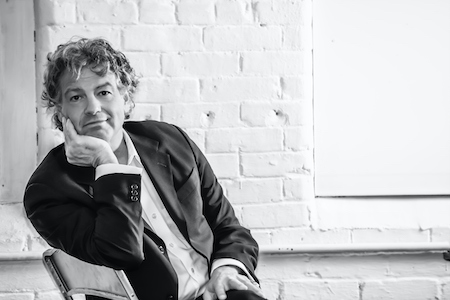Jan 13, 2026 2:09 PM
More Trump-Kennedy Center Cancellations
The fallout from the renaming of the John F. Kennedy Center for the Performing Arts to include President Donald…

“I don’t want people on my bandstand counting measures,” Malinverni said.
(Photo: Sally Green)As Pete Malinverni worked his way through a set on a January night at The Django, a Manhattan night club, the pianist leavened the music with thoughtful commentary. But when he dropped his microphone, it became clear that something more was up. Rather than pick up the mic and resume his patter, he began waving it like a priest blessing the audience with holy water.
Turned out that, in addition to being a consummate practitioner of mainstream jazz, Malinverni had a comic’s timing and a preacher’s fervor. For Malinverni — who at age 8 performed Haydn at a Pentecostal church in his hometown of Niagara Falls, New York, and these days has regular gigs at a reform Jewish temple and an ecumenical Christian church — playing music for the masses is a joyful calling.
“I think it’s important that we treat it like it’s missionary work, and we are bringing a certain message to them,” Malinverni, 64, said over oatmeal at a Manhattan diner the day after the Django performance.
The main vehicle for his message that January night was the music of Leonard Bernstein, whose songbook also provides the bulk of the material for his latest album, On The Town (Planet Arts). The album draws largely on tunes from the New York-centric Bernstein musicals Wonderful Town, West Side Story and, of course, On The Town.
“I didn’t do anything on the album I didn’t think he would like,” Maliverni said of Bernstein.
The album’s most emblematic tune may be one not associated with New York, “A Simple Song.” From 1971’s Mass, it is the only selection with overtly spiritual content and, in Malinverni’s hands, it upends Bernstein’s hymn. A rubato intro and outro envelope a simmering, decidedly unhymnlike groove — one that, in its contrarian funk, captures the spirit in which Bernstein created the original project, a radical reimagining of the traditional Catholic Mass.
Like “Simple Song,” “Some Other Time” undergoes a change from the original. A wistful ballad from the show On The Town, here it becomes an upbeat jaunt in 5/4. The idea, Malinverni said, grew in part out of a desire to avoid evoking Bill Evans’ melancholy treatment; it came to him after a process of changing keys led to his hearing the tune with “different ears.”
Malinverni began to delve into Bernstein’s oeuvre in 2018, when he was commissioned to write arrangements for a 100th anniversary celebration of the composer at SUNY Purchase, where he is chairman of jazz studies.
Malinverni does not challenge Bernstein’s original conceptions lightly. “Somewhere” remains a straightforward ballad; “I Feel Pretty,” a lilting waltz. “Cool” retains the feel of its title, with Malinverni’s left hand and Ugonna Okegwo’s bass rendering, in unison, a finger-snapping ostinato that undergirds a slinky improvisation based on the Jewish “freygish” mode, which Bernstein sometimes favored.
“There are certain things that are set in stone,” he said.
At The Django, Malinverni, by turns hunched over the keys, declaiming to the heavens, communed with Okegwo, who, as a teacher at Purchase, has developed a bond with the pianist. They built their ostinati into moments of high tension that found release in passages of straightahead blowing, which in turn gave way to pulsating solos by Okegwo or tasty trading between Malinverni and drummer Aaron Beeber. Malinverni adjusted the improvisatory cycles with cues as the music unfolded.
“I don’t want people on my bandstand counting measures,” he said. DB

Belá Fleck during an interview with Fredrika Whitfield on CNN.
Jan 13, 2026 2:09 PM
The fallout from the renaming of the John F. Kennedy Center for the Performing Arts to include President Donald…

Peplowski first came to prominence in legacy swing bands, including the final iteration of the Benny Goodman Orchestra, before beginning a solo career in the late 1980s.
Feb 3, 2026 12:10 AM
Ken Peplowski, a clarinetist and tenor saxophonist who straddled the worlds of traditional and modern jazz, died Feb. 2…

The success of Oregon’s first album, 1971’s Music Of Another Present Era, allowed Towner to establish a solo career.
Jan 19, 2026 5:02 PM
Ralph Towner, a guitarist and composer who blended multiple genres, including jazz — and throughout them all remained…

Rico’s Anti-Microbial Instrument Swab
Jan 19, 2026 2:48 PM
With this year’s NAMM Show right around the corner, we can look forward to plenty of new and innovative instruments…

Richie Beirach was particularly renowned for his approach to chromatic harmony, which he used to improvise reharmonizations of originals and standards.
Jan 27, 2026 11:19 AM
Richie Beirach, a pianist and composer who channeled a knowledge of modern classical music into his jazz practice,…